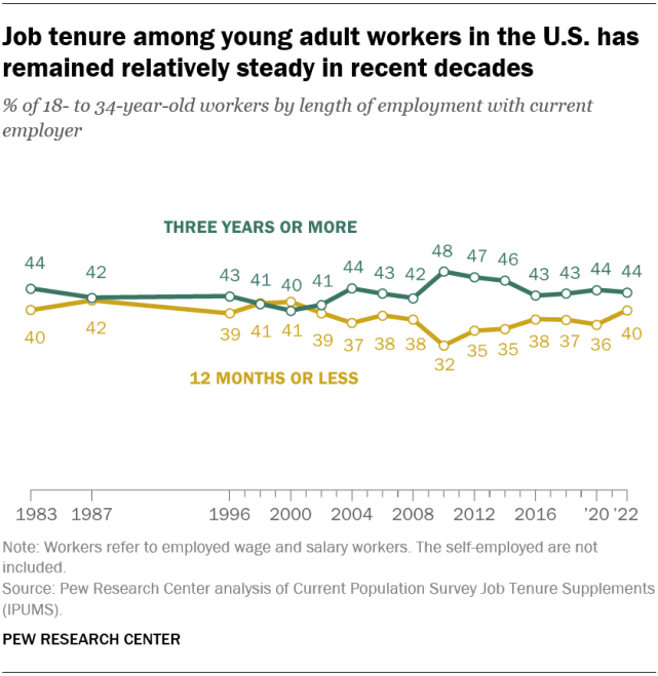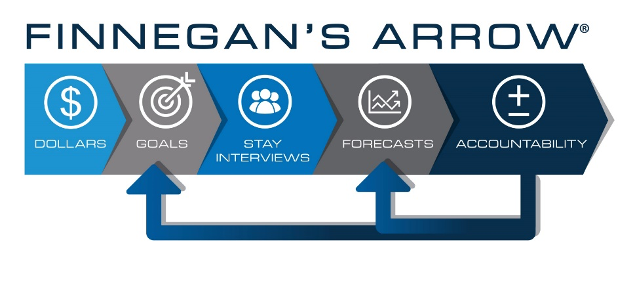Most hiring tools answer whether candidates can and will do the job, but not if they’ll stay. Learn how realistic job previews and motivational-fit interviews can improve retention from day one.
Young Workers’ Job Tenure Remains the Same: Short

This is the message from Pew Research Center’s recent study on young workers and turnover: no change in recent data.[i]
Short Tenure of Young Workers Significantly Impacts Retention
On one hand, learning that young workers’ tenure didn’t get even shorter during “The Great Resignation” raised an internal alarm. How could it be that with so many open jobs that those young workers who stray so frequently didn’t stray even more? Then the author said maybe the likely additional quits were offset because we’re at a historic low of firing people. That makes sense.
Here’s the data. Give it a close look:

So 44% of workers ages 18 to 34 stay more than three years, whereas 40% of that same worker group leave within a year. The study digs deeper with data by job, race, and gender, with the big take-away being those in professional jobs stay longer.
Our focus here is how do we keep them longer. What actions can your company take to make the 44% figure higher and the 40% figure lower? Here are three good ways to do this:
- Build realistic job previews: Our client work tells us that those who are counted here as leaving in the first year likely include a high percentage who left in their first 60 days. Think of this as the “you gotta be kidding” group who entered work on day one and couldn’t believe something about your job. That could be the loud noises, wet production floors, longer-than-promised hours, forced shift changes…or maybe a jerk boss. Commit to telling applicants the top tree reasons employees quit and the same for employees who get fired. Don’t sugarcoat but be real. Then track the number of fewer employees who leave early.
- Double your percentage of employee referrals: For most companies this means go from about 15% to 30%, not a major leap. But teach yourself that you can invent methods that work because studies have shown that referrals stay longer and perform better. Besides, we must all find alternatives to “help wanted” signs and Indeed. Hold referral open houses and ask your current employees to bring someone/increase your award amount/publicize your program more/hold new-hire trainers accountable to a referral goal because new hires know the most outside people. Or my favorite idea is telling your employees that anyone who successfully refers three new hires will earn double the stated award amount going forward for as long as they work with you.
- Use this simple job-offer script: “I’m offering you the job of ___ that pays $___ and has these very good benefits: ___. While I hope you say yes to my offer, I only want you to do so if you can see yourself being with us for at least a year. This is not a legal commitment but an ethical one. So if you are waiting to hear about another job you’d rat her have, or might relocate or go back to school for example, please say no to my offer. Our relationship will be based on trust and that trust starts now.”
Some candidates might lie but many will tell the truth, too. And they’ll remember on a bad day during their fourth month that they committed to stay at least one year.
Retention of Young Workers is the Same as Retention for All Workers – Manager Accountability
And of course, the very best way to retain newly-hired young workers…or any new workers…is to hold their managers to a new-hire retention goal and teach them to conduct Stay Interviews at least twice during the new-hire goal period. As an example, our manufacturing client companies usually establish a goal to retain 80% of new hires for 60 days. While they put into practice all of the ideas included here to make that goal, most important is their first-line supervisors conduct two Stay Interviews during the 60-day period, usually at two weeks and six weeks. All is part of our Finnegan’s Arrow model shown here:

So which of the five Arrow components matters most to improve new-hire retention? The answer is Accountability. Imagine opening your computer to see reports for each of your first-line leaders that tell you…
- Progress toward two retention goals being all turnover and new-hire retention
- Number of Stay Interviews completed and number that are late
- Each individual employee’s most recent Stay Interview, retention forecast, and stay plan
- The percentage of employees who actually have a stay plan
And most importantly, each first-line leader’s termination report that discloses who left, their length-of-service, their retention forecast, whether they had a specific stay plan to keep them, and the contents of that stay plan.
You Can Cut Turnover by 20% or More, No Matter Your Industry
There is an established solution for employee turnover…start here to learn our comprehensive turnover solution, and watch the 2-minute video to open your eyes to fresh thinking for cutting turnover 20% and more. Then schedule a conversation with me at DFinnegan@C-SuiteAnalytics.com.
[i] https://www.pewresearch.org/short-reads/2022/12/02/for-todays-young-workers-in-the-u-s-job-tenure-is-similar-to-that-of-young-workers-in-the-past/



